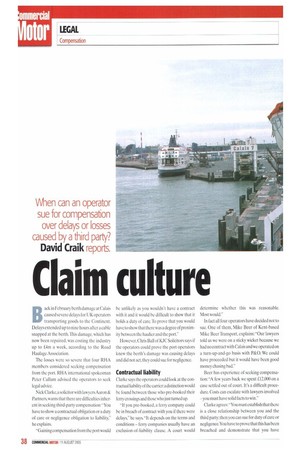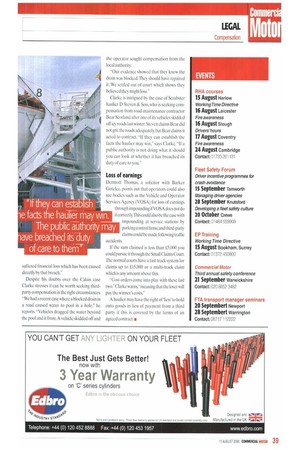Claim culture
Page 38

Page 39

If you've noticed an error in this article please click here to report it so we can fix it.
Back in February berth damage at Calais caused severe delays for UK operators transporting goods to the Continent. Delays extended up to nine hours after a cable snapped at the berth. This damage, which has now been repaired, was costing the industry up to 14m a week, according to the Road Haulage Association.
The losses were so severe that four RHA members considered seeking compensation from the port. RHA international spokesman Peter Cullum advised the operators to seek legal advice.
Nick Clarke, a solicitor with lawyers Aaron & Partners, warns that there are difficulties inherent in seeking third-party compensation:"You have to show a contractual obligation or a duty of care or negligence obligation to liability," he explains.
"Gaining compensation from the port would be unlikely as you wouldn't have a contract with it and it would be difficult to show that it holds a duty of care. To prove that you would have to show that there was a degree of proximity between the haulier and the port."
However, Chris Ball of KJC Solicitors says if the operators could prove the port operators knew the berth's damage was causing delays and did not act, they could sue for negligence.
Contractual liability
Clarke says the operators could look at the contractual liability of the carrier:a distinction would be found between those who pre-booked their ferry crossings and those who just turned up.
"If you pre-booked, a ferry company could be in breach of contract with you if there were delays," he says. -It depends on the terms and conditions ferry companies usually have an exclusion-of-liability clause. A court would determine whether this was reasonable. Most would."
In fact all four operators have decided not to sue. One of them, Mike Beer of Kent-based Mike Beer Transport, explains: "Our lawyers told us we were on a sticky wicket because we had no contract with Calais and we operated on a turn-up-and-go basis with P&O. We could have proceeded but it would have been good money chasing bad."
Beer has experience of seeking compensation: "A few years back we spent £12,000 on a case settled out of court. It's a difficult procedure. Costs can escalate with lawyers involved -you must have solid facts to win."
Clarke agrees: "You must establish that there is a close relationship between you and the third party; then you can sue for duty of care or negligence.You have to prove that this has been breached and demonstrate that you have suffered financial loss which has been caused directly by that breach.
Despite his doubts over the Calais case Clarke stresses it can be worth seeking thirdparty compensation in the right circumstances. "We had a recent case where a blocked drain in a road caused water to pool in a hole," he reports. "Vehicles dragged the water beyond the pool and it froze. A vehicle skidded off and the operator sought compensation from the local authority.
Our evidence showed that they knew the drain was blocked. They should have repaired it. We settled out of court which shows they believed they might lose."
Clarke is intrigued by the case of Scrabster haulier D Steven & Son, who is seeking compensation from road maintenance contractor Bear Scotland after one of its vehicles skidded off icy roads last winter. Steven claims Bear did not grit the roads adequately,but Bear claims it acted to contract. "If they can establish the facts the haulier may win," says Clarke. "If a public authority is not doing what it should you can look at whether it has breached its duty of care to you."
Loss of earnings
Dermott Thomas, a solicitor with Barker Cote lee, points out that operators could also sue bodies such as the Vehicle and Operator Services Agency (VOSA) for loss of earnings through impounding if VOSA does not do it correctly.This could also be the case with impounding at service stations by parking control firms:and third-party claims could be made following traffic accidents.
If the sum claimed is less than i5,(X)0 you could pursue it through the Small Claims Court. The normal courts have a fast-track system for claims up to £15,000 or a multi-track claim which is any amount above this.
"Cost orders come into play with these last two," Clarke warns," meaning that the loser will pay the winner's costs."
A haulier may have the right of 'lien' to hold onto goods in lieu of payment from a third party if this is covered by the terms of an agreed contract.•


































































































































































































